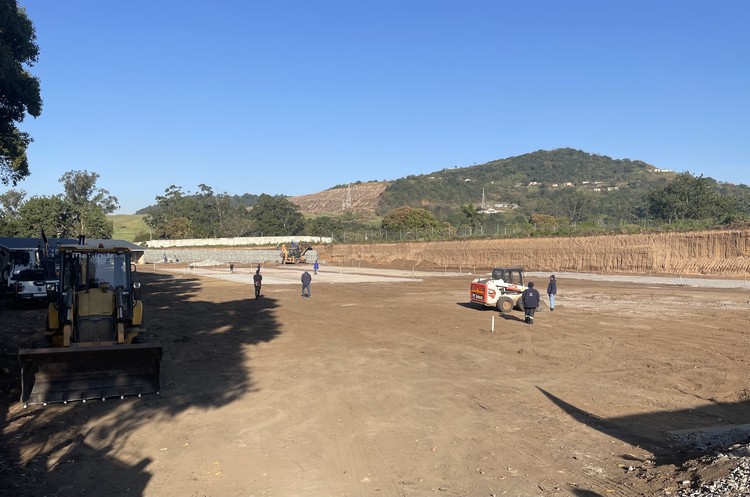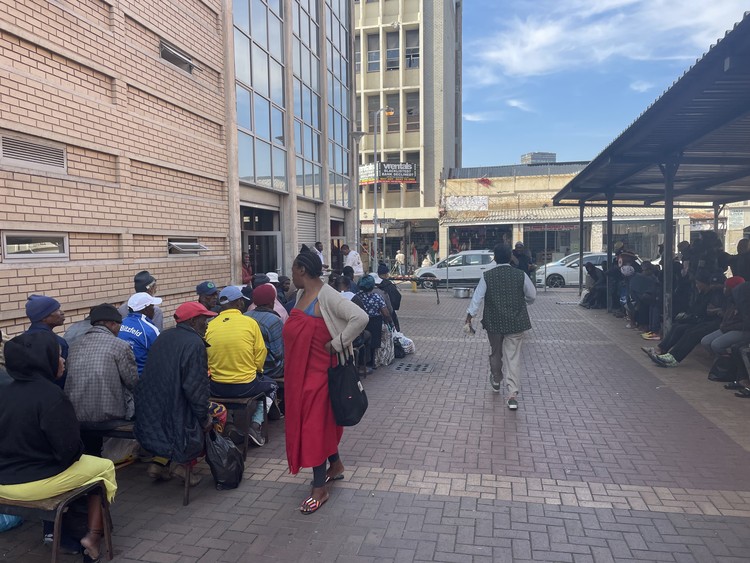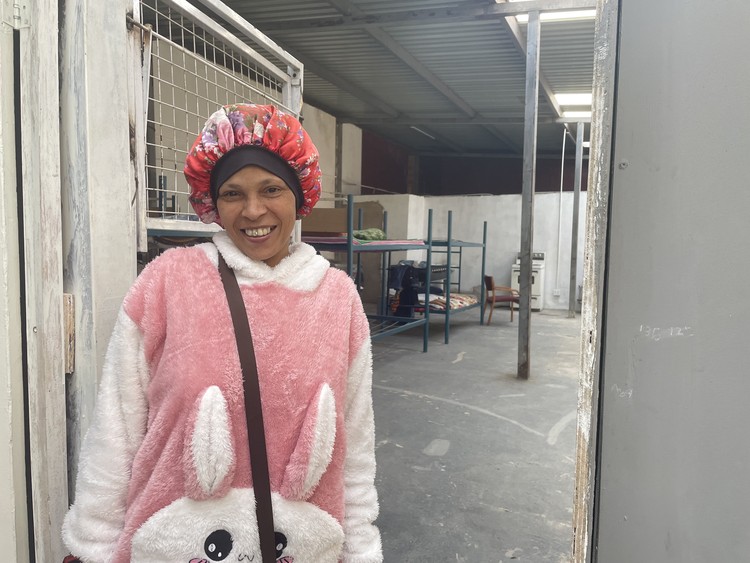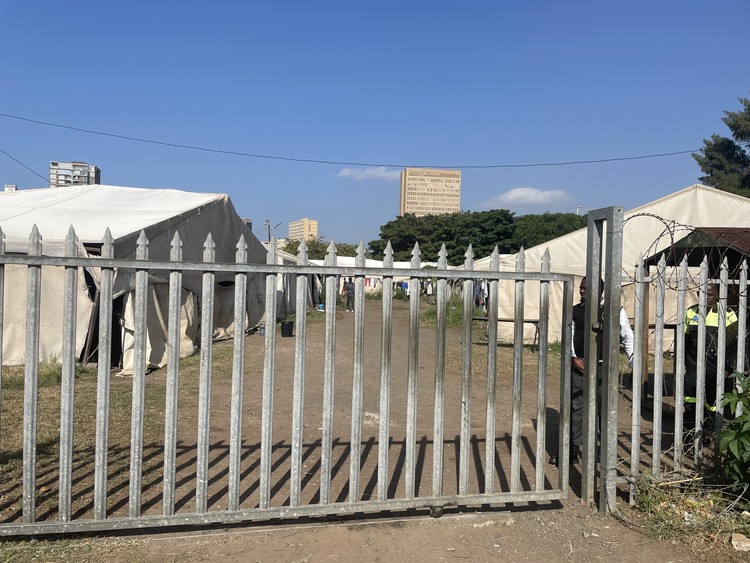Red flags raised over new shelter for homeless people in Durban
The eThekwini municipality’s Sakhithemba Homeless Shelter in Illovo is about 25 kilometres from Durban’s city centre
The eThekwini municipality is building this new shelter for homeless people in Illovo, about 25 kilometres from Durban’s city centre. Once completed, the Sakhithemba Homeless Shelter is expected to house hundreds of people and provided much-needed services. Photos: Joseph Bracken
- EThekwini Municipality is building a new homeless shelter in Ilovo, south of Durban.
- The shelter’s construction has raised concerns among non-profit organisations and Ilovo residents.
- They say the new shelter is too far from the city centre, where most people rely on income opportunities.
- According to the municipality, the new shelter will provide services like skills development, healthcare, psychosocial and drug support, skills training, and family reunification.
The eThekwini municipality is building a new shelter for homeless people in Illovo, about 25 kilometres from Durban’s city centre. The facility, known as the Sakhithemba Homeless Shelter, will house 400 people, with the potential to accommodate more if needed.
But organisations, residents of Ilovo, and homeless people we spoke to are concerned that the new shelter is very far from the city centre, and the municipality has not shared enough information on how Sakhithemba will run and what programmes it will offer.
Instead of focusing on developing smaller shelters in the inner-city that offer more opportunities for people trying to get out of poverty, the municipality is building a shelter far from the economic hub, said Raymond Perrier, director at Denis Hurley Centre.
The site was previously used as a halfway house for ex-prisoners set up by the then Department of Prisons. Then later, between 2010 and 2013, the facility housed homeless children and was run by a private organisation.
Construction started in January and is expected to cost R13-million, according to municipal spokesperson Gugu Sisilana. The site has existing buildings, but new facilities are also being built on the property.
Sisilane said the Sakhithemba centre will not just be a shelter. It will also offer support services such as skills development, healthcare, psychosocial and drug support, family reunification, and skills training to help homeless people become employable.
“Most people currently living in shelters are unemployed because they lack skills and find it difficult to secure permanent jobs,” said Sisilana.
While no monthly cost was provided to GroundUp, Sisilana said expenses at the shelter would depend on the number of residents. She said social workers, site managers, and health practitioners will be hired in “a phased, budget-conscious approach”.
Homeless census
According to a report submitted to the eThekwini Municipality by the Human and Social Development Programme and the Human Sciences Research Council (HSRC) in 2016, the homeless population in Durban’s inner city was a bit under 4,000.
In 2022 Statistics South Africa (Stats SA) volunteers counted thousands of people living on the streets and in shelters across eThekwini for the national census. A press release by the eThekwini municipality, months after the count, stated that the homeless population was sitting at about 16,000 people.
Perrier, who was involved in the 2016 report, believes the 16,000 number is an over estimate because poor counting techniques were used, which, for example, resulted in counting the same person twice. Regardless of the size of the homeless population, Perrier believes the Sakhithemba shelter won’t be enough to make a significant change.
People outside the Denis Hurley Centre waiting for lunch.
Tent cities
The municipality currently runs three shelters: one indoor facility for women and children at the Strollers Building on Mansel Road, and two tented shelters for men, “Block AK” near Greyville Racecourse, and the “Jewish Club” behind the Durban Jewish Club near North Beach.
The Jewish Club site was set up during the covid lockdown as a temporary shelter, according to Perrier, who chaired the eThekwini homelessness task team at the time. Space at this tent shelter has since been halved, but it houses almost twice as many people.
Capacities for these shelters were requested by GroundUp but not provided. According to Sisilana, the City has no plans to turn these tented sites into permanent shelters.
Perrier accused the municipality of failing to maintain their shelters so they remain “livable”. This is one of the reasons organisations lack confidence in the municipality’s ability to maintain the Sakhithemba shelter. “The same people who have consistently failed to deliver services in town, claim they’re going to deliver them to 400 people, 25 kilometres away,” said Perrier.
Ronelle Short standing outside a dorm room at the Kickstart Shelter, where she sleeps. She says people will eventually move back to the city centre from the new shelter. “There are so many empty government buildings that could be repurposed for shelters in the CBD instead of building a new shelter so far away.”
Ahmed Randeree, managing director of the Kickstart Shelter, a non-profit homeless shelter in central Durban, said their offers to lend the municipality advice on running shelters and making them sustainable, have been ignored on multiple occasions.
The City has “no foresight” when it comes to the programmes it runs, said Randeree. Previously, Kickstart ran a programme with the municipality’s City People project, where 26 people came to the shelter and were given jobs by the municipality. In the end, the programme flopped because the municipality did not do proper checks when picking candidates.
Kickstart now runs its own jobs programme, said Randeree.
Before the municipality goes and places money into new projects, it needs to fix what it has been failing at, said Randeree. “The tents are the perfect example. Show us that you can fix what you already have before you spend money somewhere else.”
New neighbours
In Lower Illovo, where the shelter is being built, there has been pushback by residents. Throughout June, the community protested, trying to halt construction.
Kuben Govender, a church and community leader in Lower Illovo, told GroundUp the municipality had not been transparent with the community about its plans for the shelter before construction began. Many residents worry that the shelter will not be properly managed, which could lead to safety issues in the community, said Govender.
Sisilana said the City had noted the community’s concern. “The shelter forms part of the City’s broader efforts to provide safe, dignified accommodation and support services to homeless individuals.”
The Jewish Club tent shelter that was originally meant to be a temporary shelter during the covid lockdown.
Support independent journalism
Donate using Payfast

Don't miss out on the latest news
We respect your privacy, and promise we won't spam you.
Next: R400-million and eight years later, these rural roads in Limpopo are still not finished
Previous: Operation Dudula faces off against human rights organisations in “misguided” protest
© 2025 GroundUp. This article is licensed under a Creative Commons Attribution-NoDerivatives 4.0 International License.
You may republish this article, so long as you credit the authors and GroundUp, and do not change the text. Please include a link back to the original article.
We put an invisible pixel in the article so that we can count traffic to republishers. All analytics tools are solely on our servers. We do not give our logs to any third party. Logs are deleted after two weeks. We do not use any IP address identifying information except to count regional traffic. We are solely interested in counting hits, not tracking users. If you republish, please do not delete the invisible pixel.




